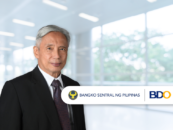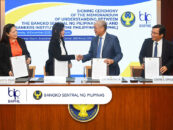
Finance Secretary Diokno Champions Blended Climate Finance at COP28
by Fintech News Philippines December 7, 2023At the 2023 United Nations Climate Change Conference (COP28) in Dubai, Finance Secretary Benjamin E. Diokno underscored the need for innovative financing mechanisms to address the growing costs associated with climate action, highlighting the significance of blended finance in escalating climate action in developing countries like the Philippines.
Secretary Diokno’s discussion centred on aligning finance and investments with national climate plans, systematically allocating financial resources, and engaging the private sector in funding climate-smart infrastructure. These approaches were deemed as crucial for achieving the targets of the Paris Agreement, which aims to limit the global temperature rise.
The Philippines, adhering to its Nationally Determined Contribution, has pledged a significant reduction in greenhouse gas emissions across various sectors by 2030. This commitment is in line with the Paris Agreement’s goal to keep global temperature rise below 2°C above pre-industrial levels, aiming ideally for a 1.5°C limit.

Secretary Diokno speaking at the panel discussion on Blended Finance to Mobilise Private Investment for Climate Adaptation: Progress to Date and Bigger Potential Going Forward. Source: Department of Finance
In his speech at a high-level roundtable organised by the UAE, Secretary Diokno also touched upon the Philippines’ initiatives to involve the private sector in climate adaptation and infrastructure projects. He discussed the Marcos, Jr. administration’s ‘Build Better More’ Programme, emphasising climate adaptation. This was part of a panel discussion featuring noted figures like Karin Isaksson and Marc-Andre Blanchard, focusing on the mobilisation of private investment in climate adaptation.
Regarding infrastructure investment, the Philippine government has earmarked 197 Infrastructure Flagship Projects, worth approximately PHP 8.7 trillion. These projects, which include climate-resilient infrastructure, will be financed through various channels, including public-private partnerships.
The Philippines is further opening its economy to foreign investments, especially in the renewable energy and electric vehicle sectors, allowing for full foreign ownership in these areas. Secretary Diokno highlighted the country’s inaugural Medium-Term Fiscal Framework, which aims to balance macro-fiscal stability with economic growth.

Ministerial Meeting on The Role of Finance Ministers in Mobilising Public and Private Climate Finance. Source: Department of Finance
At a gathering with the Coalition of Finance Ministers for Climate Action, Secretary Diokno shared insights into the Philippines’ strategy for bolstering climate finance, including the Climate Change Expenditure Tagging system’s role in tracking and reporting on climate-related programmes.
In 2022, the Philippines launched a Sustainable Finance Framework to attract sustainable investments. Additionally, the government is developing Sustainable Finance Taxonomy Guidelines to promote private sector investment in environmentally and socially sustainable initiatives.
Diokno concluded by emphasising the importance of considering climate action financing as an integral component of economic growth and development, rather than as a secondary concern. This perspective highlights the need for a comprehensive and coordinated approach in climate finance to achieve sustainable development and environmental resilience.








